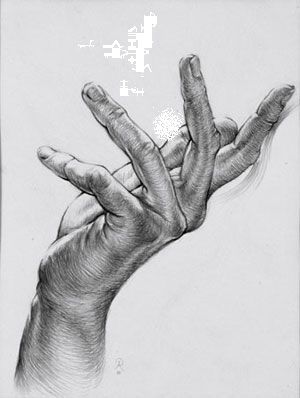Simon
May 12, 2021
The 1977 Penguin paperback edition of The Book of Sand is in two parts. Part one consists of a baker’s dozen of late short stories which take up 90 pages. Part two contains 35 poems taken from two of Borges’s final volumes of poetry, The Gold of the Tigers and The Unending Rose, presented in the original Spanish with English translations by the Scottish poet Alastair Reid on the facing page, and also taking up about 90 pages.
There’s an author’s note and an afterword. In the author’s note Borges reaffirms his allegiance to H.G. Wells, often overlooked by literary studies but clearly one of the most fertile, imaginative and influential writers of the first half of the twentieth century.
I have tried to be faithful to the example of H. G. Wells in combining a plain and at times almost colloquial style with a fantastic plot.
In the event, some of the premises of the stories may be fantastical, but they are all conveyed in such a low-key, downbeat, almost offhand manner that you barely notice. The stories don’t signpost their own remarkableness, they downplay it. The stories feel different from those in Dr Brodie’s Report, more consistently fantastical or imaginative than the determinedly realistic narratives in that collection – but both books have more in common and are very different from the intensely bookish ficciones of his Labyrinths phase. Any reader hoping for more ficciones will be sorely disappointed but will, if they allow their expectations to be reshaped by the texts, be rewarded by subtler, more fleeting pleasures.
The stories
1. The Other (location: Cambridge, Massachusetts)
A very relaxed, low key story in which Borges quietly remembers going to sit on a bench in Cambridge Massachusetts overlooking the Charles River and realising the young fellow who’s sitting at the other end of the bench is his own self, 50 years earlier. The young self thinks he is sitting on a bench in Geneva overlooking the river Rhone. Old Borges chats a bit about what’s happened to mum and dad, then when young Borges reveals the book in his hand is by Dostoyevsky, they fall to chatting about literature, as you do, quoting Victor Hugo and Whitman.
Beneath our conversation about people and random reading and our different tastes, I realized that we were unable to understand each other. We were too similar and too unalike. We were unable to take each other in, which makes conversation difficult. Each of us was a caricature copy of the other. The situation was too abnormal to last much longer…
Neither is terrified, but both afflicted with unease, and so hasten to make their excuses, say goodbye, promise to meet up the next day, and walk briskly away with no intention of keeping the rendezvous.
You know the big difference between this and a story by H.G. Wells. This one has no excitement. It is a teasing situation, but with no development or payoff. In fact it just dribbles to a close.
2. Ulrikke (York, England)
The narrator is named Javier Otálora. He is a professor at the University of the Andes. He is visiting York (in England) when he hears a pretty young woman talking in the hotel bar, gets chatting to her, they go for a walk across the freshly fallen snow which becomes steadily more archetypal or allegorical. There are no cars or roads, just them alone in the deep woods. They hear a wolf howl, she kisses him, they invoke the shades of Sigurd and Brynhilde, they arrive at another inn, climb as in a dream up the stairs to a bed where they make love. I think it is a waking dream. I think the author has been beguiled into some kind of re-enactment of the Sigurd and Brnyhilde legend.
3. The Congress (Argentina, 1902)
Don Alejandro Glencoe was a Uruguayan ranch owner and landowner. At one time he had ambitions to stand for the Uruguayan Congress but the political bosses barred his way. And so, inspired by something he’d read, he decided to set up a Universal Congress, representing all people, representing all humanity. He starts the process by inviting an assortment of 20 or so people to meet regularly at the Gas-Lamp Coffee House in Buenos Aires, trying to ensure a cross-selection, including women and gauchos and blacks. The narrator is Alejandro Ferri and we follow as he is, first, told about the Congress, then taken along, then becomes an active participant, travelling to England on research into ways to expand it and into which books to order to create a definitive library for the Congress.
Soon after his return, in what one could possibly take to be a typically quixotic, random, Hispanic gesture, Don Alejandro scraps his own creation and abolishes the Congress, insisting the members take the library of (rather random) books they have painstakingly assembled and burning them in the street. The members go on to have a wild, intoxicating night together, then part, never to see each other, but convinced by Don Alejandro’s exhortation that the Congress is not dead; on the contrary, it has now become universal and all men and women are members of it, even if they don’t know it. All this happened between 1899, when the narrator arrived in Buenos Aires, and 1902, when he undertook his ill-fated journey to a snowbound London.
The best of Borges’s ficciones left you with your mind completely blown by the intensity and profundity of the ideas and visions he conjured up. These stories are much more ‘meh’. This is the longest of all Borges’s works of fiction and, after this volume was published, he claimed it was his favourite. Meh.
4. There Are More Things (Buenos Aires)
A deliberately hammy hommage to the lurid horror stories of H.P. Lovecraft, this one concerns a young student just finishing his studies. He had an uncle who had a house built in a suburb of Buenos Aires. The narrator gets news that his uncle has, sadly, died and then follows from a distance the subsequent developments, namely that the house is sold to a mysterious man who asks the original architect to build new extensions, which the architect indignantly refuses to do. After a few more investigations, the narrator one night, min a heavy storm, finds himself at the gate of the mysterious house, finds himself pushing open the gate, walking up the path, pushing open the front door and investigating the apparently empty and abandoned house and discovering it full of artefacts which make no sense, which don’t seem to have been designed for the human body or purposes… and while he is slowly coming down the stepladder from the attic, he hears the sound of ‘slow and oppressive and twofold’ coming up the ramp into the house…

5. The Sect of the Thirty (4th century Mediterranean)
A fairly brief account which purports to be a manuscript from the fourth century AD describing a Christian heresy, dwelling on the origin of the number 30 before going on to consider the drama of the Crucifixion and to identify ‘intentional’ and ‘unintentional’ actors in it, concluding that there were only 2 intentional ones, namely Jesus and Judas. So the ‘Sect of the Thirty’ takes its name from the thirty pieces of silver which Jesus gave Judas.
This echoes the ficcione ‘Three Versions of Judas’ in which a renegade theologian develops the idea that the real Son of God was Judas, for whereas Jesus was resurrected and went to heaven after a few hours suffering, Judas made the ultimate sacrifice and condemned himself to everlasting hell.
6. The Night of the Gifts (1874 Argentina)
Many years ago in the old Confitería del Águila on Florida Street up around Piedad, a group of men are gathered and having an earnest discussion about Plato’s theory of knowledge (which is that we already know everything but have forgotten it, so that ‘learning’ is merely remembering) when an older man interjects with a long and complicated story.
It is the story of the most memorable night of his life, the night of the thirtieth of April 1874,when he was little more than a boy, he was staying on the ranch of some cousins, and met Rufino, a seasoned cowhand. One night Rufino takes him into town to a brothel down a dirty back alley. The narrator is a bit overwhelmed. When confident Rufino sees him looking at a younger, shy woman, Rufino asks her to tell her tale. In a dreamy voice, the young woman, nicknamed The Captive, begins to tell the story about the time the Indians raided her ranch and took her away, but she’s barely got as far as the Indians riding towards her when the door bursts open and real-life bandits enter, led by the notorious outlaw Juan Moreira! He starts causing a lot of noise and when the little house doggy approaches, whips him so hard the dog dies there and then.
Terrified, in all the brawling, the boy narrator slips down a hallway, finds a secret stairwell and goes upstairs, into a room and hides there. It is, unsurprisingly, the room of The Captive, who quietly comes in, closes the door, slips off her clothes and makes him lie with her. It’s not described but the implication is that he loses his virginity.
But then there’s a lot more banging and a gunshot and the Captive tells our narrator to leave by the back stairs. He does so, nips across the garden and shimmies over the wall. He comes face to face with a policeman who grins and lets him go, but as he loiters, the famous outlaw Moreira slips over the same wall, presumably escaping the cops who’ve gone in the front, and the policeman steps forward and bayonets Moreira. And again. While the horrified boy looks on
Then we snap back to the ‘present’ and the now-old man reflecting on his story, that he experienced two of the Great Experiences of Life in the same night, losing his virginity and seeing a man killed in front of him.
7. The Mirror and the Mask (medieval Ireland)
After the battle of Clontarf on 23 April 1014, in which he had defeated a Norse-Irish coalition, the High King of Ireland orders his chief bard, Ollan, to commemorate it in heroic verse. The story quickly becomes a kind of fairy tale, for it is structured round three magical events. The king gives his bard a year to go to England, travel widely, and compose a great poem. A year later he returns, and amid great ceremony, recites the poem, which is a masterpiece, which repeats and supersedes all the conventions of his forebears. The king rewards him with a silver mirror.
Then the poet goes off to England for another year, sees and hears many things, returns and this time reads from a manuscript, a poem which is much stranger, in form and substance, combining the Christian Trinity with the pagan gods, in which subject and verbs and nouns do not agree but present strange new combinations. Dazzled, the king says that only the learned can understand so strange a composition and that he will store the manuscript in an ivory casket and he gives the poet a golden mask.
After another year the poet arrives at the king’s court but he is a man transfigured, ‘His eyes seemed to stare into the distance or to be blind.’ This time the man asks to see the king alone and laments that the has produced the finest poem yet but wishes the Lord had prevented it. He asks for the hall to be emptied and then recites the poem which consists of just one line, but which is so transcendent, so numinous that both king and bard are shaken to their core, both wondering whether knowing such Beauty is a sin.
‘The sin of having known Beauty, which is a gift forbidden to men. Now it behoves us to expiate it. I gave you a mirror and a golden mask; here is my third present, which will be the last.’ In the bard’s right hand he placed a dagger. Of the poet, we know that he killed himself upon leaving the palace; of the king, that he is a beggar wandering the length and breadth of Ireland – which was once his kingdom – and that he has never repeated the poem.
It is a deep and powerful fable.
8. Undr (11th century Sweden)
This short text is pleasurably complicated, working at multiple removes in narrator and time and place. First of all it claims, in the time-honoured way, to be a transcription of a fragment of manuscript found in a dusty old volume in a library, namely an account by of Adam of Bremen, who, ‘as everyone knows’, was born and died in the eleventh century, and it starts off by being an account of what he has discovered about a people named the Urns, who live in Scandinavia.
But barely a page has gone by before Adam brings in a specific character, a traveller from Iceland named Ulf Sigurdsson. Adam claims to have met him at Uppsala, by the famous pagan temple there, where Ulf tells him his story. So now we have three layers of text:
- the introductory paragraph explaining this is all a manuscript in an old book
- the text itself describing Adam’s journeys into Sweden
- the narrative of Ulf
Ulf explains that he was a skald or poet from Iceland and had travelled to Sweden because he had heard that the Urns create poems with just one word. He meets a blacksmith who prepares him to be taken before the king of the Urns, Gunnlaug, in readiness for which Ulf composes a drapa, an elaborate genre of Icelandic poetry. However, when he performs it for the king, although the latter gives him a silver ring, his place is soon taken by a local poet who strikes his lyre and recites a poem which consists of just one word and everyone is much moved.
On leaving the king’s cabin, Ulf is accosted by a fellow poet, Bjarni Thorkelsson, who confirms that the old tropes Ulf used have been superseded and tells him his life is in danger. Together they conspire to get Ulf onto a boat which heads south.
At this point follows a brief summary of the rest of Ulf’s life, which was action-packed and included being an oarsman, a slave dealer, a slave, a woodcutter, a highwayman, a singer, a taster of deep waters and metals, spending a year in the quicksilver mines, fighting in the Varangian guard at Constantinople, having a big love affair with a woman by Sea of Azov, fighting a duel with a Greek, fighting the Blue Men of Serkland, the Saracens.
At the end of this long life, Ulf is a tired old man who makes his way back to the land of the Urns and, after some difficulty, finds the house of the fellow skald who saved him, Bjarni Thorkelsson. Bjarni is bed-ridden and insists on hearing Ulf’s entire life story. As a reward he takes up his harp and speaks the one Word, undr, which means ‘wonder’. The wonder of the world, and finally he understands.
With that the text ends. It does not go back up a level to Adam’s narrative, or up two levels to the original framing modern explanation. It deliberately ends on this symbolic note.
In the afterword Borges points out that one of his most famous ficciones is about an infinite library which contains every combination of every letter in every language ever conceived by man. This is the opposite, a story about just one word, which manages to capture the entire life of a culture.
9. A Weary Man’s Utopia (centuries in the future)
Some kind of vision or maybe dream. The narrator identifies himself as Eudoro Acevedo, born in 1897 in the city of Buenos Aires, 70 years old, a professor of English and American literatures and a writer of imaginative tales i.e. an avatar of Borges himself.
He is walking over a plain in the rain and sees the lights of a house and walks over to it and the door is opened by a tall man who invites him in and signals straight away that he has entered a different century, apparently in the future when other languages have fallen into desuetude and educated people speak Latin. The host is very relaxed and says they receive visitors from the past ‘from century to century’.
In this future the people are taught to forget history and culture and to rise above the present, to live in all time. He is four centuries old and has only read half a dozen books. Printing has been abolished. For his part the narrator explains that in his world, there were newspapers which made a big fuss about the latest news, a continuous turnover of trivia, plus advertising for a thousand and one products no-one needs. To fully exist you needed to be photographed.
Whereas in this future nobody has possessions, there is no money. People study philosophy or play chess. They are free to kill themselves. Everyone must sire one child but this means the human race is slowly dying out. Politics has ceased to exist because nobody paid any attention. He spends his time painting, he shows the narrator some of his paintings and gives him one as a gift.
Then a woman and three or four men enter the house peacefully and they work with the owner to dismantle all the belongings and then carry them through the streets to a crematorium where they burn all his belongings. The scene cuts back to the ‘present’ where the narrator is writing this text,
In my study on Mexico Street, in Buenos Aires, I have the canvas that someone will paint, thousands of years from now, with substances today scattered over the whole planet.
There is no drama and barely any plot. Instead it is a thing of changing moods and angles.
10. The Bribe (Texas 1969)
As the narrator admits at the outset this is more of an anecdote than a story. It concerns three American academics who are all specialists in Anglo-Saxon literature. It takes quite a while to explain because it is about a subtle psychological point which requires an explanation of the ‘politics’ in the English Department at the University of Texas.
A key figure in the department is the upright scion of a New England family Dr Ezra Winthrop. He has been helped in his editing of Anglo-Saxon texts by the able scholar Herbert Locke. A conference is coming up, in Wisconsin. Winthrop is advising the head of the department, Lee Rosenthal, who to send.
Recently the department has been joined by a naturalised American of Icelandic descent named Eric Einarsson. The text describes a series of publications he’s made, starting with a new edition of the Anglo-Saxon poem The Battle of Maldon (which I have reviewed in this blog) then, only a few weeks before the conference, he publishes a long article in the Yale Philological Quarterly. The aim of the article is to attack the way Anglo-Saxon is taught in the department, which mainly focuses on Beowulf (which I have reviewed in this blog) which the article considers too long, confused but above all too refined and baroque a production to teach beginners.
Partly as a result of the article, Winthrop advises Rosenthal to choose Einarsson to represent the department at the forthcoming conference, rather than the loyal capable Locke. The story such as it is, boils down to the final and only real scene in the text, wherein Einarsson drops into Winthrop’s office to thank him for helping choose him to attend the conference – and then candidly lets Winthrop know how he engineered the decision. When he first met him, Einarsson was surprised that Winthrop, despite being a principled Northern, defended the South’s right to secede from the Union in the American civil war. Einarsson realised in a flash that Winthrop’s rigid Puritan morality made him bend over backwards to see the opposing point of view.
That is why he wrote a long article criticising the way the department teaches Anglo-Saxon. It was reverse psychology. He knew that Winthrop would bend over backwards to be fair so someone who had just attacked him, and choose Einarsson over loyal Locke. And that is just what happened. Low-key, eh? Subtle.
11. Avelino Arredondo (Montivideo 1897)
A peculiar story set in Montevideo, the capital of Uruguay, in 1897 during the civil war which ravaged the country. It tells of a man from the country, Avelino Arredondo, a little over 20, thin, shortish, poor. He is a part of a group of young men who meet at the Café del Globo. One day he tells them he is going away. He kisses goodbye to his girlfriend, Clementina, adieu to his friends, but instead of setting off to a distant town as he told everyone, he holes up in his little apartment, never going out or reading the papers, attended by an ancient servant who brings him his meals. All is aimed towards the morning of the twenty-fifth of August, which is months away and, because this date is mentioned several times, the reader naturally wonders what might happen. Because the slow passage of time and in fact the change in the subjective experience of time is mentioned several times, we wonder if this is a science fiction story and some fabulous transformation will take place.
Alas, no. Arrendondo wakes on the morning of 25 August, dresses, breakfast, then makes his way to the cathedral square just as a group of dignitaries are leaving morning Mass. He asks a bystander to point out the president of this wartorn country, Juan Idiarte Borda, then pulls out a revolver and shoots him dead. He belongs to the other side in the civil war (the Whites against the Reds). At his trial he is careful to emphasise that he has lived isolated from the world for months, having said goodbye to his girlfriends, all his acquaintances and not read a newspaper for months – all the more to bring out that this was an entirely existential decision by he and he alone.
12. The Disk (Anglo-Saxon England)
A wonderfully short and strange story. The narrator is a poor woodcutter. A stranger turns up at his hut. He gives him food and shelter. Next morning they go for a walk. When the stranger drops his staff he orders the woodcutter to pick it up. ‘Why?’ asks the woodcutter. ‘Because I am king,’ says the stranger, ‘I am of the line of Odin’. The woodcutter replies he is a Christian. The slightly mad old king says he can prove he is king by showing him the thing in his hand. He opens his fist. There is nothing there, but when the woodcutter tentatively puts out his finger he feels something cold and sees a glitter in the sunshine.
Here is the one spooky eerie detail which makes the whole thing cohere. The king tells him it is Odin’s disk and it has only one side. In all the world there is nothing else with only one side.
13. The Book of Sand
The narrator suffers from myopia, lives in a flat by himself. A tall stranger knocks on the door, he lets him in. He says he is from the Orkney Islands. He says he sells Bibles, The narrator replies that he already owns several English translations of the Bible (as you might expect). Then the salesman opens his case and gets out another book. He bought it off an illiterate Untouchable in India. It is called the Book of Sand because, like the desert, it has no end.
No matter where he opens it there seem to be more pages at the front and back. The pages bear fantastically large page numbers and it is impossible to find one again. They haggle about a price and the salesman parts with it for a monthly pension payment and the black letter Wycliff Bible, packs his case and leaves.
Only then are we treated to the slow possession the infinite book begins to exert over its owner. He stops going out, he devotes his life to trying to tabulate the content of the infinite book, he becomes paranoid, he hides is behind other volumes on his shelves, but he begins to realise it is driving him mad, he realises the bookseller came to him willing to get rid of it at almost any price.
One day he takes it along to the National Library (which Borges himself was Director of), slips past the staff, down into the dusty basement, and without paying too much attention to the rack or shelf or position slips it in among thousand of other anonymous volumes and quickly departs, as if from the scene of a crime.
Late style
Writers who live long enough often develop a recognisably late style. In these late stories Borges is closer to the ficciones of Labyrinths than he was in Dr Brodie’s Report – for a start they’re not all set in contemporary Argentina as most of those stories were; many return to the European settings or to the remote times and places of the ficciones, although he appears to show a fondness for rugged medieval pagan Europe more than the flashy worlds of Islam and China which attracted him in the ficciones. I know what he means. There’s something more genuinely weird and eerie and rebarbative about hearing one wolf howl in the great snowy Northern forests, than there is in seeing a thousand geniis pop out of a bottle or all the dragons of Chinese legend.
But it’s not so much the subject matter, it’s the treatment. The tales are more elliptical and elusive. Borges’s late style has learned to eschew flashy effects for something more subtle and lateral. I liked Ulrikke, The Mirror, Undr, A Weary Man because the inconsequentiality of the dream subject matter matches the flat obliquity of the style.
Is it the wisdom of age or the tiredness of age or the indifference of age? Or is it the result of Borges’s blindness? He never learned braille and dictated all his later works, having them read back to him and correcting them orally, a completely different method of composition from seeing the words you write, and re-seeing them, and seeing them again as you review over and over what you have written to give it not only a rhetorical flow but a visual styling, on the page. None of that here. All of that dense reworking, the temptation to be ‘baroque’, had departed along with his sight.
Was it all or any or a combination of these factors, or just a realisation that, after the metaphysical pyrotechnics of ficciones, it was on many levels more satisfying to play a subtler game, to create not the vaunting elephants and leaping tigers of a Salvador Dali painting, but the subtle understatement of a miniaturist. In the afterword Borges describes A Weary Man’s Utopia as the most ‘honest’ of the stories. In it the exhausted and ancient man of the future devotes his life to painting what appear to be modest, not very dramatic, and semi-abstract works.
I examined the canvases, stopping before the smallest one, which represented, or suggested, a sunset and which encompassed something infinite. ‘If you like it, you can have it as a keepsake of a future friend,’ he said matter-of-factly. I thanked him, but there were a few canvases that left me uneasy. I won’t say that they were blank, but they were nearly so.
Maybe that is an apt description of these stories, products of an old man, far advanced in his chosen craft, indifferent to praise or blame, making them for his own amusement, no longer impressed by the flashy effects of youth and middle age. Lucid and reflective.
I won’t say that they were blank, but they were nearly so.
Nearly… but not quite.
ASTROFELLA
















